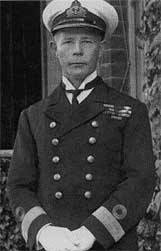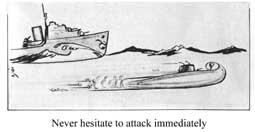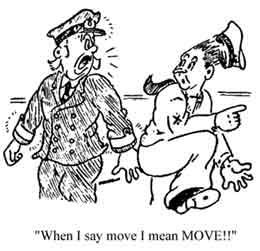
Vice-Admiral Sir Gilbert Stephenson KBE, CB, CMG
Commencing
in 1940 a special training school was set up by Admiral Sir Percy Noble
as part of the Independant Western Approaches Command. Opperating from
the small fishing town of Tobermory on the Island of Mull in Scotland,
its purpose was to train the newly formed crews of Covettes, frigates,
sloops and Patrol Service trawlers, in an intensive 2 to 3 week course
on the methods of Anti-Submarine warfare. The man given the job of being
in command, was a very efficient, strict and energetic man in his mid-sixties
who's fierce and controversal methods became much talked about by all
those who were under him.
'Let 'em Learn!' - by Jimmy Brown
The Pusser Royal Navy always regarded the activities of the Royal Naval
Patrol Service with a sort of fascinated horror. These stiff-upper-lip
products of the Royal Navy's training school at Dartmouth had encountered
nothing to prepare them for this motley fleet of mainly fishing trawlers
and drifters manned by scruffily rigged unshaven individuals who looked
more like Captain Henry Morgan's pirates than the regular RN ratings they
were used to. Were they expected to take seriously this rag-tag and bob-tail
lot that were drafted beside them to sweep up the mines and even sink
Hitler's U-boats? The truth is that we had nothing else to offer but these
requisitioned fishing vessels and their men, most of whom were already
in the Royal Naval Reserve. As the war ground on, wartime conscripts diluted
the crews of the trawlers but Harry Tate's Navy never did conform to full-blooded
Royal Naval discipline and it remained independent and bloody-minded to
the end.
This is not to say that the Admiralty did not try to instil a modicum
of discipline into the officers and men of the Patrol Service. They did,
setting up a Training School at Tobermory under the command of Vice-Admiral
Sir Gilbert Stephenson KBE,CB,CMG. His headquarters were an old horse
boat which was dignified by the title *HMS Western Isles" and in it Commodore
Stephenson, or 'Monkey Brand" as he was more familiarly known, set to
work. Born in 1878, the Admiral had a long and distinguished career in
the Royal Navy - too long to be detailed here - and he was in his sixties
when the Second World War started so he could have been excused for taking
a back seat - but no danger. He was in there from the start and his famous
foghorn of a voice was heard loud and clear wherever he was. He was on
the beach at Dunkirk and when he finally turned up at London's Victoria
Station, scruffy and unkempt, and without even a vestige of uniform, the
people there took him to be a refugee. It is perhaps just as well that
the Admiral had lost his powerful voice at Dunkirk otherwise he might
well have lifted the roof off Victoria Station.
After Dunkirk he moved to Tobermory. His remit was to organise a fourteen-day
course that would smarten up the converted trawlers and turn them into
something approaching warships. His methods were unorthodox, to say the
least. If he thought an officer was not up to his job he would remove
him forthwith and if Their Lordships down in Whitehall didn't like it,
they could lump it! He had a habit of cruising about the anchorage in
his Admiral's Barge, boarding unsuspecting travrlers and roaring out various
alarming; orders such as: "I'here's a bomb just gone down your funnel
- what are you going to do about it!" or "I'hat's a U-boat on your port
bow - what are you going to do?" And so on. One day he boarded a
trawler without being seen, crept up behind the unsuspecting quartermaster,
and whispered in his ear: " There's a fire in the mess-deck!" "Oh yes
sir," replied the quartermaster. "We always keep a good fire on down there."
The Admiral's reactions were not recorded.
But he didn't always get things his own way. Another time he was creeping
up on an old trawler at anchor when he was spotted by the crew who managed
to get lined up on deck before he climbed over the gunwale. But the Admiral
wasn't to be beat that easy. Without any preliminaries he took off his
gold-braided cap and threw it down on the deck before the quarternaster,
shouting: "that is a small unexploded bomb dropped by an enemy plane -
what are you going to do about it! The sailor, who had heard about the
admiral and his unconventional methods, promptly took a step forward and
kicked the cap into the sea Everyone waited for the expected roar of protest
from the admiral but not at all. He warmly commended the lad on his initiative,
before pointing to his cap bouncing about on the waves shouting: "that's
a man overboard - what are you going to do about that!" So they had to
jump over the side to rescue his cap. This man overboard ploy was one
of his favourite tricks but he definitely met his match one day when he
climbed aboard a trawler, grabbed a lifebuoy that was lying on the deck,
chucked it overboard and came his 'man overboard' lark. But the skipper
corrected him gently, saying: "I'm afraid you are mistaken sir, there
is no man overboard, only a lifebuoy." In a great rage the admiral tore
off his uniform jacket and cap and jumped in himself, coming up to splutter:
"I'here's a man overboard nowl"
  |
|
(Above)The important lesson of team work and the counter- attack of the U-boat taught by the Commodore and encapsulated in cartoons by Captain J. Broome. These illustrations were used in the revised Instruction Manual and issued to Escort Groups. |
But
the list of anecdotes is endless. They could fill a book. In fact they
did fill a book. TV personality Richard Baker served under the Commodore
and he produced a very readable account of this great man back in 1972
entitled The Terror of Tobermory (W.H. Alien) to which I am indebted
for checking my facts. Apparently Richard was skylarking at a party aboard
his ship one night which got out of hand to the extent that he woke up
next morning covered all over with gentian violet. He does not say how
this came about but the important thing is that gentian violet takes months
to fade and Richard thought his luck was out next morning when his captain
gave him a message to deliver to the Commodore. He was a young midshipman
in the RNVR at the time and was naturally dreading appearing before the
commodore with his bright mauve features. The old man didn"t bat an eyelid
at Richard's purple countenance as he delivered his message but as he
turned to leave with much relief he asked :'What's your name, sonny!"
Richard told him. "And what's your job on board? "I'm Assistant Gunnery
Control Officer, sir, and Entertainments Officer." "Oh I see, said the
commodore. "Well I see you take the second part of your job very seriouslyl"
Richard reckons he was lucky to escape with his life.
 |
TV
Personality Richard Baker served under the Commodore and wrote
the book 'The Terror of Tobermory' (W.H. Allen) thus committing
Vice-Admiral Stephenson to something of Royal Naval Legend and
notoriety!
(left) The Western Isles Crest: Motto 'Let 'em Learn!' |
 |
Very
much a loose cannon, Admiral Stephenson ignored Their Lordships and went
his own way regardless. But he got results and that was the main thing.
He applied for a rum ration for his men but the Admiralty turned him down,
saying his was not a sea-going command. Nothing daunted, Admiral Stephenson
up-anchored and took his ancient horse-boat to sea, returning to send
a signal to the Admiralty renewing his request and mentioning casually
that he had just returned from a cruise round the Hebrides. He got his
nun ration.
Post war Admiral Stephenson was for many years Honourary Commodore of
the Sea Cadets. He held regular reunions for his old boys which were well-attended
and lived a happy and active life well, into his nineties. He once made
headlines in his later years when it was discovered that he always slept
with a loaded pistol by his bed, secured to his bedside by a lanyard.
Charged with keeping an offensive weapon, he appeared in court to say:
"What is the point of having a gun at your bedside if it isn't loaded?
Do you think an intruder will wait while I load it! The magistrate demurred,
wondering what would happen if someone else got a hold of the gun but
was assured there was no danger of that happening, his lawyer asserting
that the admiral wouldn"t part with his gun to anyone, "not even to Jesus
Christ himself!" The admiral got to keep his gun.
In view of recent cases in the press about poor burglars being molested
by vicious householders impudent enough to want to protect their property,
it is perhaps a matter for regret that we don't have more people going
about nowadays of the calibre of Admiral Sir Gilbert Stephenson, MBE,
CB,CMG. We salute his memory

.